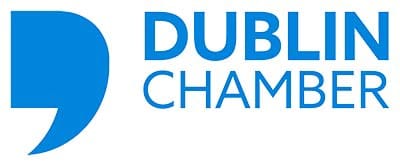Dublin Chamber, established in 1783, plays a vital role in advocating for Dublin’s business community and promoting the city as a global hub. With a diverse membership spanning various sectors, the Chamber supports economic growth through advocacy, networking, and international trade missions. As the voice of Dublin business, the Chamber speaks and lobbies on behalf of its members, to help address their concerns and propel their success. The Chamber also focuses on vital aspects affecting the business atmosphere, namely: developing Dublin region’s infrastructure and housing supply, promoting competitiveness, and improving local governance.
In a recent interview with Bridges, Mary Rose Burke, CEO of Dublin Chamber, discussed Ireland’s resilient economy and its competitive strengths within the EU, citing agriculture, technology, pharmaceuticals, and financial services as key sectors. She highlighted Ireland’s robust economic recovery, post-pandemic, attributing much of this resilience to Dublin’s pivotal role as an economic powerhouse in the country. Burke underscored the capital city’s appeal due to its favorable business environment, skilled workforce, and excellent connectivity, which positions it as a preferred destination for multinational corporations. This ecosystem supports a thriving network of startups and SMEs, leveraging Dublin’s infrastructure and business support services. Specifically, Dublin has emerged as a significant tech hub within the EU.
Within the realm of Japan-Ireland relations, Dublin Chamber facilitates partnerships and business opportunities between Irish and Japanese companies, maximizing Dublin’s strategic advantages. Burke emphasized Japan’s significant role as a strategic and trading partner for Ireland, and also spoke of the importance of fostering closer cooperation between both nations.
Overall, this interview reflects Dublin Chamber’s commitment to promoting Dublin as a global business destination and stresses its role in driving economic vitality through international collaboration.
Bridges: How would you characterize the current state of the Irish economy, and what do you see as its key competitive strengths within the European Union?
Ms. Burke: The Irish economy is robust and growing, with Dublin playing a pivotal role as its economic powerhouse. The country has shown strong recovery, post-pandemic, driven by both domestic demand and a thriving export sector. Dublin is central to this growth. With its favorable business environment, skilled workforce, and excellent connectivity, Dublin is a preferred destination for multinational corporations.
Dublin has established itself as a major tech hub in the EU, hosting the European headquarters of global tech giants like Google, Facebook (Meta), and LinkedIn. Additionally, Dublin boasts excellent connectivity, with Dublin Airport as a key international gateway to the European Single Market and beyond.
What do you identify as the core competencies of Irish industry today, and which sectors do you see as particularly important or emerging, both for SMEs and large enterprises?
Ireland’s core competencies lie in technology, innovation, and a highly skilled workforce, underpinned by favorable tax policies and a robust regulatory environment, with Dublin as the anchor of this dynamic landscape.
Ireland’s core competencies lie in technology, innovation, and a highly skilled workforce, underpinned by favorable tax policies and a robust regulatory environment, with Dublin as the anchor of this dynamic landscape.
Mary Rose Burke, Chief Executive Officer of Dublin Chamber
In the tech sector, Dublin hosts the European headquarters of giants like Google and Meta, fostering a vibrant ecosystem of startups and SMEs supported by incubators and accelerators. The pharmaceutical and life sciences industries are also pivotal, with major companies such as Pfizer investing heavily in R&D and innovation within the city. Dublin’s financial services sector stands out as a key European hub, benefiting from a skilled labour pool and EU-aligned regulatory standards.
Agriculture and food production remain important for the Irish economy as a whole, focusing on high-quality, sustainable products that drive significant export opportunities, particularly for SMEs. Additionally, the renewable energy sector is emerging rapidly, reflecting Ireland’s commitment to sustainability, and offering new avenues for innovation and growth for businesses of all sizes.
Could you elaborate on the connections between Ireland and Japan, particularly in terms of investment, customer relationships, and partnerships for Irish companies? How significant is Japan as a strategic partner for the Irish economy?
Dublin Chamber celebrates the longstanding relationship between Japan and Ireland; Japan is Ireland’s 11th largest trading partner and the largest source of FDI into Ireland from Asia. The EU and Japan Economic Partnership Agreement entered into force on the 1st February 2019. This Trade Agreement opens a new marketplace of 635 million people and almost a third of the world’s GDP. It is estimated it will save European businesses €1bn in duties annually. Japan is one of Ireland’s closest partners in Asia and we who are in the Dublin Chamber welcome closer cooperation between our countries and between Dublin and Tokyo.




